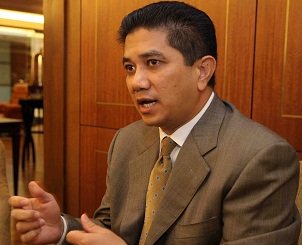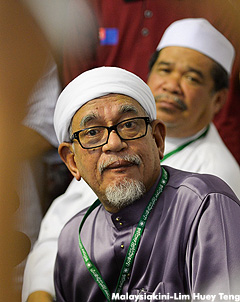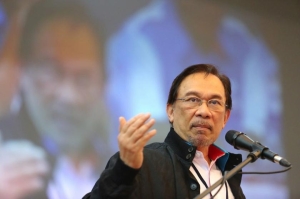UMNO have lost support of a sizeable section of the Malay middle-classes, following disappointing results in the 2008 and 2013 general elections,, they failed to wrest Malaysia's wealthiest state back from Pakatan Rakyat,. The silence of Prime Minister Datuk Seri Najib Razak , UMNO president, is deafening. His absence from Selangor political scene felt tired as it was humiliating that BN is mentioned as the opposition in Selangor. - he campaigns tirelessly during assembly polls in Selangor for the hearts and minds the of Malay middle-classes. Dr Mahathir added that Selangor Umno leaders were more intent on strengthening their position instead of the party.
In order to carry out reforms in Selangor Umno, the first major change which must be implemented is the acceptance of new members.
Minister Datuk Seri Najib Razak lamented how embarrassed he was that Barisan Nasional (BN) was the opposition in Selangor.the 50-year-old political party that won Malaysia its independence, should speak up on major issues. This makes a lot of sense after UMNO’ worst electoral defeat ever that was more through default. apart from the eve of elections, or when acknowledging defeat afterwards with a dimpled smile — is inexplicable. And this does damage not just to UMNO but to the quality of democracy as well. The ruling party is being given a free run, virtually without the presence of an active Opposition party. rather than by any strategic or leadership acumen. More damaging is Najib complete isolation and remoteness from the party, its workers and voters. In abustling democracy like Malaysia one cannot hope to be an absentee landlord.It is not just active presence that creates an impact. Absence can be equally, if not significantly more, telling. As has been exemplified by the curious case of the dog. In Silver Blaze, a story written by Arthur Conan Doyle in 1892, Sherlock Holmes asks Inspector Gregory, what the dog did on the night of the crime. Said Gregory, “The dog did nothing in the night-time.” Quoth Holmes, “That was the curious incident.”Dr Mahathir said.
Anwar Ibrahim is both a political icon and a game changer in Malaysian politics. A former anointed successor to Tun Dr. Mahathir, he was charged for Sodomy in 1998 and imprisoned for a considerable period of time in Sungai Buloh.
Many thought it was the end of his political career, but the irrepressible Anwar rose from the ashes, so to speak, to lead a loose coalition of odd partners comprising DAP, PAS and his own Parti KeADILan Rakyat in the 2008 Elections. It fired the imagination and passion for change of Malaysian voters and that, in turn, brought a rather quick end to the Badawi Administration. In 2009, Najib Tun Razak became Prime Minister.
Despite spending time in and out of our courts defending himself against another charge of sodomy, Anwar again led Pakatan Rakyat (PR) in 2013 General Elections well. Although it did not take Putrajaya, PR won 51 per cent of the popular vote. Yet Sodomy 2 refused to go away. Anwar was found not guilty by the High Court but on appeal, the Najib administration was able to overturn the verdict and now Anwar’s political future will be decided by the Federal Court in the next couple of days. If he is convicted, he returns to jail.
True, he will not able to be in politics directly. In stead, he will become our prisoner of conscience and may be able to revive the Reformasi Movement from the walls of his prison. It would be a serious error if Najib assumed that he would be able to break up PR, by taking Anwar out of the equation.
PR may not survive in its present form. That in part will depend on how secular DAP and islamist PAS can accommodate each other to keep thecoalition intact and be ready to face GE-14. It is going to be tough since PAS has become enigmatic of late. Internal conflicts inside, PAS is very susceptible to the idea of unity with UMNO for race and religion. That makes it an unreliable ally.
I do not rule out PKR as a significant political force. A new young dynamic team of young leaders like Nurul Izzah Anwar, Rafizi Ramli, Nik Nazmi et.al. has emerged. I will also not underestimate the influence of Anwar Ibrahim on this new generation in PKR, and his hold on his prodigy Azmin Ali, Menteri Besar of Selangor. But Anwar must know that he can no longer dictate party policy once he is in jail. He must leave PKR leadership to act on its own.
Anwar Ibrahim will today meet with one of three fates: a conviction, which will see him back behind bars and barred from politics for what is likely to be the rest of his natural life; a delay in the Federal Court decision, which will keep him and the rest of the nation in suspense for some time; or freedom from his shackles and another chance to wrest control of Malaysia’s ultimate political power.
Whichever of these outcomes comes to pass, one thing is becoming exceedingly clear – the age of Anwar Ibrahim is over. Some may have a negative knee-jerk reaction to this assertion. However, the signs are certainly pointing that way for contemporary Malaysia’s greatest revolutionary. At 67 years old, he has had two cracks at the bat and almost brought down the government that packed him away into prison for years.
Through the years, we have seen massive rallies in support of his cause, and his undeniable charisma is evident to those even watching him walk by. Anwar Ibrahim is indeed the greatest political revolutionary of our time, and even his enemies cannot deny his achievements if they are honest with themselves.
Since the political tsunami of 2008 that rode upon his leadership and charisma, there has arisen a new guard of young and dynamic politicians waiting in the wings for their time to come. The focus should be on cultivating these future leaders, preparing them for the day they will pick up the fight for Malaysians of all stripes. Like it or not, in 10 years, it is these leaders who will either be leading our government or continuing Anwar’s good fight, and that in itself makes it worthwhile for the old guard to invest in their future.
But a more immediate issue arises should the court rule in favour of the prosecution. Pakatan Rakyat will suddenly be left without a clear leader. The loss will be especially painful for PKR, which was built around his personality and upon his struggle. Without their focal point, the way forward for PKR is cloudy at best.
Parti Keadilan Rakyat (PKR) was formed in 2003, a merger of the older Malaysian People’s Party and the National Justice Party, which was born from the Reformasi movement. Today it has gained a reputation as a centrist party, with lawyers, civil society crusaders and social justice advocates bolstering its ranks of disaffected Barisan Nasional members. Originally led by Wan Azizah, the party celebrated the return of Anwar to politics in April 14, 2008, and promptly installed him as their de facto leader.
Harsh realities
Indeed, PKR and Anwar Ibrahim are stuck together like Siamese twins sharing a heart. The idea of one being divorced from the other is almost impossible to imagine, but political realities are much harsher than we’d like to believe. In the case of a conviction or an Anwar unable to play the game of politics, what then happens to PKR?
It’s likely that in the short term we will see the coming to power of Azmin Ali, who served Anwar for years as his most trusted advisor, and has now ascended to the position of Menteri Besar of Selangor.
 Azmin is something of a controversial figure in his party. There are in fact several factions within PKR that do not want to see him assume leadership. But in the inevitable chaos surrounding the exit of Anwar, it’s safe to assume he will take charge, though Rafizi Ramli may have other ideas regarding that situation.
Azmin is something of a controversial figure in his party. There are in fact several factions within PKR that do not want to see him assume leadership. But in the inevitable chaos surrounding the exit of Anwar, it’s safe to assume he will take charge, though Rafizi Ramli may have other ideas regarding that situation.
Ultimately, we can foresee Nurul Izzah, Anwar’s daughter and Member of Parliament for Lembah Pantai, assuming leadership of the party. There will be obstacles, with some trying to hold her back, but Izzah has the chops and rapport with the public to assume the presidency in the future.
But for now it’s more important that the party seize the moment and look towards a new platform. After spending so long being Anwar’s warhorse, the People’s Justice Party will have a chance to rebrand itself as more than just that and focus on justice for the people. PKR’s infighting has lessened the value of the name somewhat, and the Selangor Menteri Besar crisis made it look petty and impotent, with it’s grand political strategy falling around its ears. At this point, its main concern should be rebuilding it’s credibility by focusing on the issues and not the individual.
There are many pressing, deeply concerning issues that loom before the Malaysian public – the rising cost of living, the potential unavailability of cheap medicine due to data exclusivity in the TPPA, the implementation of the GST and so on. While some of our opposition politicians have been active in articulating these issues, they’ve been drowned out by the noisy drama of Malaysia’s political circus. It’s time for PKR to find consensus, strengthen its image and go about the job of speaking for us in the corridors of power.
As for Pakatan Rakyat – well, that is one kettle of fish we don’t envy Anwar’s successor for. The opposition coalition is the strongest yet in Malaysian history, and came ever so close to unseating Barisan Nasional in the last general election. But the cracks are obvious. The media have taken notice of the distinct lack of PAS support at Anwar’s hearings, reduced to the token MP here and there, but nothing like the mass of humanity that PAS can call to its side at a moment’s notice.
successor for. The opposition coalition is the strongest yet in Malaysian history, and came ever so close to unseating Barisan Nasional in the last general election. But the cracks are obvious. The media have taken notice of the distinct lack of PAS support at Anwar’s hearings, reduced to the token MP here and there, but nothing like the mass of humanity that PAS can call to its side at a moment’s notice.
 successor for. The opposition coalition is the strongest yet in Malaysian history, and came ever so close to unseating Barisan Nasional in the last general election. But the cracks are obvious. The media have taken notice of the distinct lack of PAS support at Anwar’s hearings, reduced to the token MP here and there, but nothing like the mass of humanity that PAS can call to its side at a moment’s notice.
successor for. The opposition coalition is the strongest yet in Malaysian history, and came ever so close to unseating Barisan Nasional in the last general election. But the cracks are obvious. The media have taken notice of the distinct lack of PAS support at Anwar’s hearings, reduced to the token MP here and there, but nothing like the mass of humanity that PAS can call to its side at a moment’s notice.
Coupled with the internal conflict within PAS itself and the constant hearsay of PAS exploring a unity government option with UMNO, it looks as if the tenuous ties that bind Pakatan Rakyat are fraying, and badly.
Direct conflict
To say that PAS and DAP’s differences extend to their ideas about good governance is, of course, more BN propaganda spin than truth. But then again, the best lies are two parts truth and one part lie. The two parties are beginning to show that they might become polar opposites, especially now that PAS’ ulama faction has begun to flex its muscles. The liberal agenda of DAP, though often exaggerated by cybertroopers, comes into direct conflict with the ultra-conservative stance of some in PAS, and hence we see tension erupt into open conflict every once in a while.
 Without the central figure that is Anwar, the future of Pakatan largely relies on the three parties finding a point of consensus with each other. In truth, all three are politically symbiotic in that the appeal of each party is enhanced and weaknesses are shored up by the others. Without the DAP, PAS could not appear as widely popular to the urban vote. DAP would find it hard to spread word out without PAS’ far-reaching network. And PKR provides a centrist platform to find common ground on the divisive issues.
Without the central figure that is Anwar, the future of Pakatan largely relies on the three parties finding a point of consensus with each other. In truth, all three are politically symbiotic in that the appeal of each party is enhanced and weaknesses are shored up by the others. Without the DAP, PAS could not appear as widely popular to the urban vote. DAP would find it hard to spread word out without PAS’ far-reaching network. And PKR provides a centrist platform to find common ground on the divisive issues.
This relationship is on the verge of dissolution, and a future without Anwar may see PAS or at least its most conservative elements striking out on their own, unless the three decide on the fundamental level upon which they can cooperate for political benefit and thus solidify the foundation of the coalition. Life after Anwar does not have to be bleak. But it will be hard.



No comments:
Post a Comment